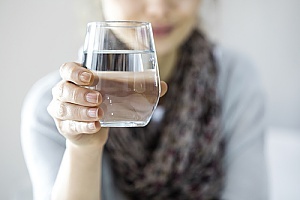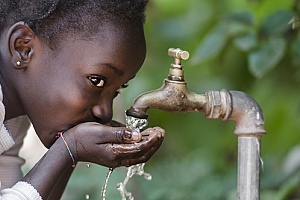We often take clean drinking water for granted. It’s there when we turn on the sink, take a shower, and go shopping. Access to safe water, however, is a luxury that a small percentage of the world can enjoy. Millions of people lack the ability to easily and quickly nd clean drinking water for themselves and their families. The crisis is particularly widespread in Liberia. A devastating civil war, followed by an Ebola outbreak, have severely limited Liberians’ access to clean and safe water.

To help resolve this crisis, The Last Well has committed to giving every Liberian access to clean drinking water by the end of 2020. The organization uses a combination of water projects, hygiene education, and sanitation efforts to bring water to millions of Liberians each year in pursuit of this mission. As a result, many of these common problems associated with dirty drinking water are beginning to disappear from the country.
Community Health
The largest factor in the quest for clean drinking water is community health. Diarrhea, which is caused by a lack of safe drinking water, is one of the top 10 causes of death in the world. Dirty water, which is often the only type available, can cause even more health issues. Water that is unsafe for drinking can carry a range of serious illnesses, making it difficult for community members to work, attend school, and live comfortable lives. Through a combination of access to clean drinking water and education regarding sanitation and hygiene, many of the health problems that result from dirty water can be avoided.
Strength of Education
Communities that lack clean drinking water often lack a strong educational system as well. Most people in the community are so preoccupied with accessing water that they find it difficult to support educational systems. Children are often tasked with procuring the water, which can be located far away from their communities. This leaves them little time to participate in the education options that are available to them. Children who are lucky enough to go to school will still likely encounter dirty water during their lifetimes, causing them to endure health issues that in turn affect their ability to attend school and may keep them home while they recover.
Community Safety
Finally, the lack of clean drinking water can affect safety for the entire community. Sources of clean drinking water, if any, are often located far away from the communities that so desperately need them. Women and children are often tasked with walking hours each way to collect this water for their families. They may be forced to walk along busy streets or through isolated jungle areas, each of which presents serious safety risks. With multiple trips often required, the daily risks for vulnerable populations are high. Clean drinking water located closer to each community can keep women and children in safer areas for longer

How The Last Well Is Providing Clean Drinking Water
The Last Well is entering its final year of its mission to provide clean drinking water to all of Liberia. Over the past 10 years, The Last Well has provided clean drinking water to more than two million Liberians through its more than 8,000 drinking water projects. Each of these projects includes clean drinking water systems, alongside hygiene and sanitation education that helps people understand how to maintain drinkable water. The organization expects to reach an additional 2,500 communities in this year alone. Along with clean drinking water, The Last Well spreads the Gospel to the communities it reaches and brings God’s message of love.
How You Can Help
Speak to The Last Well for more information and to make your donation today. All of the organization’s operational costs are funded by a small group of donors who have chosen to assist in this way, so every dollar you donate goes directly to on the ground projects to bring clean drinking water and the Gospel to Liberia. Donors can choose to make a general donator, sponsor one village’s clean water efforts, or make a Barge Pledge donation, which provides clean water to 20 people and saves a life in the process.







